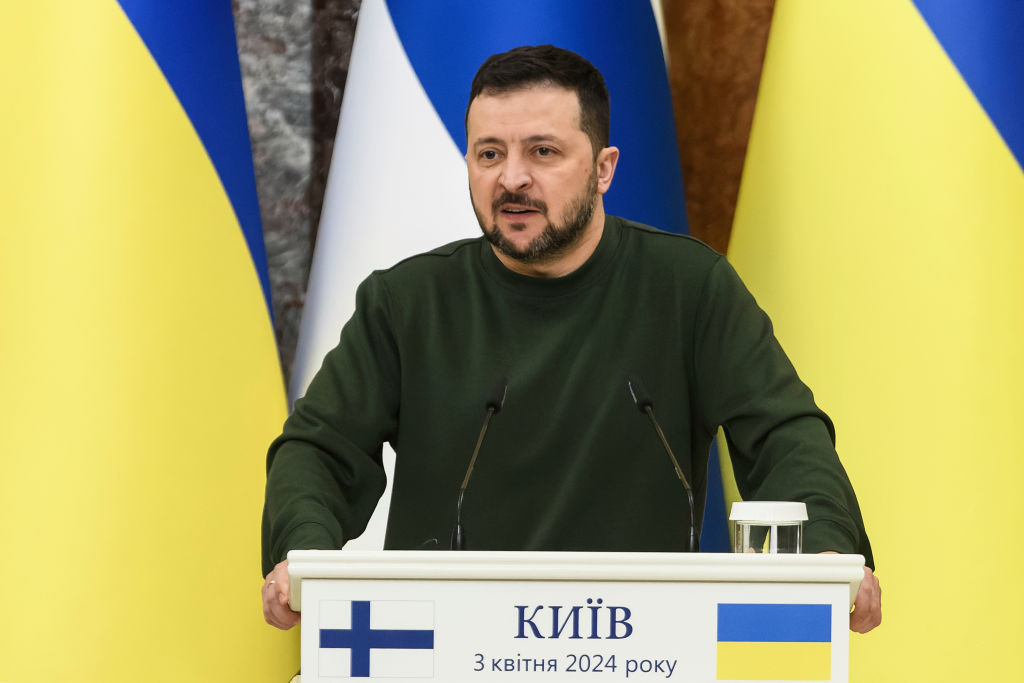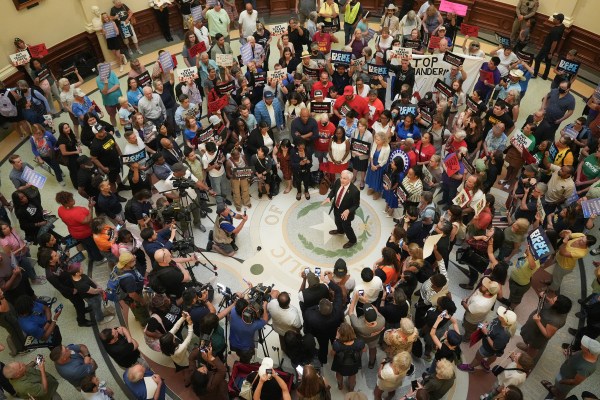Happy Thursday! We hope your day will be better than the Swiss government ministers who had to give up their free, government-issued annual ski passes under pressure from the social media hordes. Ah, vox populi, vox dei.
Quick Hits: Today’s Top Stories
- Former Israeli Defense Minister Benny Gantz—a member of Prime Minister Benjamin Netanyahu’s war cabinet and leader of National Unity, a coalition of opposition parties—on Wednesday called for early parliamentary elections to be held in September. “What Israel needs is quiet in the ballot box, not flames in the streets,” Gantz said. If the current schedule remained intact, the next Israeli elections would fall in October 2026, though Israel has held five elections since 2018. Large-scale demonstrations continued across Israel on Wednesday with protestors pushing for elections and demanding the return of hostages held by Hamas.
- NATO Secretary-General Jens Stoltenberg announced Wednesday that NATO members are exploring plans for the alliance to take the lead on coordinating and providing aid to Ukraine—a role the U.S. played during the first two years of the war through an informal coalition known as the Ramstein Group. “We must ensure reliable and predictable security assistance to Ukraine for the long haul,” Stoltenberg said. However, National Security Council spokesman John Kirby suggested Wednesday that the U.S. isn’t prepared to cede its leadership role. “[The Ramstein Group] is bigger than NATO,” he told reporters. “It’s 50-some-odd nations all around the world, including in the Indo-Pacific—and what brought them together was American leadership.”
- Georgian Dream, the ruling party of the South Caucasus country of Georgia, announced a renewed plan to pass a controversial “foreign agent” security law that would require civil society organizations that take money from overseas to register as operating on behalf of foreign interests. Georgian Dream lawmakers first introduced the law last March, sparking large protests for its close resemblance to a Russian law passed in 2012 used to stifle dissent.
- The judge overseeing former President Donald Trump’s criminal trial in New York over hush-money payments to a porn star in 2016 denied Trump’s request to delay the start of the trial, currently set for April 15. Trump’s legal team had argued the trial ought to wait until the Supreme Court ruled on his claims that the presidency granted him certain immunity from prosecution, but Judge Juan Merchan rejected the appeals, arguing Trump’s attorneys had waited too long to raise their concerns.
Ukraine Battles On

With the war in Ukraine now in its third year, Ukrainian President Volodymyr Zelensky has collected some hard-earned wisdom. “If you are not taking steps forward to prepare another counteroffensive, Russia will take them,” he told the Washington Post’s David Ignatius last week. “That’s what we learned in this war: If you don’t do it, Russia will do it.”
In that spirit, Ukrainian political and military officials are trying to reclaim the upper hand on the battlefield even as stalled U.S. support makes the Ukrainian lines increasingly vulnerable. Earlier this week, Zelensky signed a new and controversial conscription law—which went into effect Wednesday—that could expand the base of men eligible for the draft and potentially relieve exhausted frontline troops. Though it seems increasingly likely that the House of Representatives could pass a much-needed aid package for the besieged country in the next month, as ever in this war, there is no panacea. Meanwhile, Kyiv’s forces are striking deep into Russian territory—despite the U.S. government’s concerns—in an attempt to hobble the Russian war machine.
The first three months of the year have been marked by Russian advances that put Ukrainian forces on the back foot. The fall of the town of Avdiivka in February was emblematic of the compounding problems Ukraine is facing: Expending valuable and already-scant ammunition to repel Russian troops sent in as cannon fodder, exhausted and overrun Ukrainian troops—some of whom hadn’t left the front in two years for lack of manpower—had no choice but to retreat. It was Ukraine’s most significant loss in nearly a year. Elsewhere in Ukraine, the story isn’t quite so dramatic, but it’s nevertheless bleak. “Since February, it’s fair to say that the Russians have been making slow but steady advances,” Dalibor Roháč, a senior fellow at the American Enterprise Institute who studies Central and Eastern Europe, told TMD. “Ukrainians have been able to slow the Russians down but not hold them all together.”
The Institute for the Study of War (ISW), a think tank that tracks Russian troop movements, assessed Tuesday that since the first of the year, the Russians have taken 304 square kilometers—about 117 square miles, roughly equivalent to the size of Charleston, South Carolina. (Click here to see ISW’s interactive map of the frontline, updated daily.) Though that may not sound like much, Ukrainian rationing of materiel makes “the frontline overall more fragile than the current relatively slow rate of Russian advances makes it appear,” the ISW team wrote Tuesday in its daily situation report.
To slow the Russian advance even further, Ukraine needs more troops and more weapons at the front. The country made some progress toward the first goal earlier this week when Zelensky signed a bill lowering the military conscription age to 25 from 27 for Ukrainian men. The president had previously been reluctant to expand the draft, and disagreements over Ukraine’s manpower needs were reportedly part of Zelensky’s decision in February to replace Gen. Valerii Zaluzhnyi, who had criticized Zelensky’s reticence, as commander of the Ukrainian armed forces. Zelensky was concerned about how the additional troops would be paid amid budget shortfalls, and other critics of an expanded draft worry about what it would mean for the fragile wartime economy to remove more young men from the workforce.
But the costs of the manpower shortage on the frontlines are also real. In an ideal situation, active-duty troops would rotate away from the frontlines at regular intervals—but some of Ukraine’s battle-weary forces have spent years at the front. Zaluzhnyi had argued that 500,000 additional troops were needed to replenish depleted forces. His replacement, Gen. Oleksandr Syrskyi, said in a recent interview that that estimate had been “significantly reduced,” and indeed, the number of new recruits this law makes available may be somewhere around 50,000. Still, Syrskyi said, “It is necessary to take into account the fact that people are not robots. They are exhausted, physically and psychologically, especially in combat conditions.”
Either in a sign of the lightning rod the conscription question has become or of the urgent need for men, Zelensky chose to quietly sign the bill that has been sitting on his desk for almost a year, even though there’s currently a more expansive draft-reform bill being debated in parliament. The president’s office initially made no statement about the president’s decision; instead, officials simply updated the bill’s status on the parliament’s website. Zelensky also signed a bill Tuesday that would create a database of draft-age men to make it easier to catch draft dodgers. Under Ukraine’s martial law, men under the age of 60 are not allowed to leave the country except under special conditions.
While Ukraine is taking modest steps to increase manpower, arming those troops presents a different challenge. The country has ramped up its own defense industrial base and developed a cottage industry of drone manufacturing—and European countries have continued to provide weapons and artillery—but American support is difficult to replace. The mammoth $60 billion U.S. supplemental aid package has now been languishing in Congress for months, and all the while, Russia has strategically depleted Ukraine’s air defense systems such that Ukrainian troops are having to try to down incoming drones with machine guns mounted in the beds of pickup trucks. “If Russia finds a weakness in the Ukrainian frontline and chooses to exploit it, the lack of materiel is going to make it more challenging for Ukrainians not only to respond to this, but also be able to offset it with a different operation or a counteroffensive somewhere or a counter-attack,” Kateryna Stepanenko, a Russia analyst at ISW, told TMD.
House Speaker Mike Johnson indicated Sunday he was willing to move forward with an aid package to Ukraine when the House returns from its recess next week. Johnson blocked the version the House passed in February because it had been stripped of provisions to strengthen the U.S. southern border—even though Republicans in the Senate stripped the package of those provisions with former President Trump’s backing. This weekend, Johnson—whose right flank is threatening his speakership over the aid package—suggested he was interested in tying the aid to ending a hold on new liquefied natural gas exports, a potential deal-sweetener for Republicans. Even if his negotiations are successful, the House is unlikely to vote on the supplemental funding until the back half of this month. Earlier this morning, Politico reported the White House has spent the past few weeks backchanneling with Johnson about how to pass the aid without triggering his own ouster.
NATO Secretary-General Jens Stoltenberg said this week the alliance is looking to bring under its umbrella some of the ad hoc responses the U.S. has been spearheading since Russia’s 2022 invasion—reportedly because the U.S., and Republicans led by Trump, in particular, are seeming like increasingly unreliable partners. One idea that has received mixed reactions? A $100 billion slush fund for Ukraine managed by NATO itself, rather than aid decisions being left up to individual member countries as is currently the case. Stoltenberg is also reportedly mulling taking over the Ukraine Defense Contact Group (or Ramstein Group), a U.S.-led coalition of the willing that coordinates aid deliveries.
Formalizing these processes under the consensus-based NATO structure isn’t foolproof. “If you institutionalize it, and if every decision has to be signed off by [Hungarian President] Viktor Orbán and [Turkish President] Recep Tayyip Erdoğan, then it arguably risks slowing things down,” Roháč told TMD, naming the two leaders in the alliance who held up Finland and Sweden’s NATO accession for years. “It also gives bad faith actors the space to extract concessions from everybody else.”
In the immediate absence of military aid for its frontline war, Ukraine has in recent months attacked deeper and deeper into Russian territory with its home-grown drones, disrupting supply lines and targeting weapons depots and factories. On Tuesday, Kyiv’s forces hit a Russian drone factory and an oil refinery in Tatarstan, some 750 miles from Ukrainian territory and the furthest into Russia that Ukraine has attacked thus far. U.S. officials have reportedly privately warned Kyiv against targeting refineries for fear it could raise global oil prices—and indeed, the cost of a barrel of Brent crude did go up this week following the Tatarstan attack.
On Wednesday, the U.S. Ambassador to NATO Julianne Smith took issue with the entire notion of Ukrainian strikes inside Russian territory. “That is something that the United States is not particularly supportive of,” she said. “We are focused on [Ukraine’s] right to defend its territory, to push Russians out of its territory.”
The U.S., France, and the United Kingdom, which have supplied Ukraine with long-range missiles, instructed Kyiv not to use the weapons for attacks in Russian territory, citing fears of escalation. It’s a promise the Ukrainians seem to have kept. But even Western long-range missiles can only travel 180 miles, give or take. “We used our drones,” Zelensky told the Post before the most recent attack, which also used a Ukrainian drone. “Nobody can say to us you can’t.”
Roháč agrees with Zelensky’s sentiment. “It is a sort of stunning double standard to apply to Ukraine, in saying that they are not allowed to strike targets within Russia when obviously Russia is striking as Ukraine’s territory—the whole war is taking place in Ukraine,” he told TMD, adding that he believes Ukraine has attacked targets of legitimate strategic value to the war effort. “The second interesting element of the story is Americans complaining about it, especially at a point when we’re not really providing that much assistance to Ukrainians.”
Worth Your Time
- Writing for his Substack, Pax Americana, former National Security Council official and CIA analyst Michael Shurkin argued Washington misunderstands the potential for a crisis between Venezuela and Guyana. “I’ve lately been having conversations with D.C. people about American responses to Venezuela President Nicolás Maduro’s threats to annex the Essequibo region of Guyana,” he wrote. “They reminded me once again of how often D.C. establishment people seem to lack imagination when it comes to what potential adversaries might do, sometimes with terrible results. … The reality is that actors like Maduro might not be rational. Or, they are rational but come to different conclusions than we do, for one reason or another. … I do not intend here to make predictions regarding whether Maduro will attack Guyana. Maybe he will, maybe he won’t. I have no idea. My point really is to question the apparent consensus in Washington, D.C. that he won’t and can’t. Indeed, part of the argument why he won’t is the assumption that he can’t. The thing is, he can. And, indeed, he just might.”
- In The Atlantic, Derek Thompson explained his come-to-Jesus moment about religion in America. “I have spent most of my life thinking about the decline of faith in America in mostly positive terms,” he wrote. “Only in the past few years have I come around to a different view. Maybe religion, for all of its faults, works a bit like a retaining wall to hold back the destabilizing pressure of American hyper-individualism, which threatens to swell and spill over in its absence. … On an individual basis, people can give any number of valid-sounding reasons for not frequenting a house of worship. But a behavioral shift that is fully understandable on the individual level has coincided with, and even partly exacerbated, a great rewiring of our social relations. … I’m not advocating that every atheist and agnostic in America immediately choose a world religion and commit themselves to weekly church (or synagogue, or mosque) attendance. But I wonder if, in forgoing organized religion, an isolated country has discarded an old and proven source of ritual at a time when we most need it.”
Presented Without Comment
Axios: House Freedom Caucus Chair Backs Capitol Rioter’s Bid for Congress
Also Presented Without Comment
New York Times: Patient With Transplanted Pig Kidney Leaves Hospital for Home
The first patient to receive a kidney transplanted from a genetically modified pig has fared so well that he was discharged from the hospital on Wednesday, just two weeks after the groundbreaking surgery.
Toeing the Company Line
- In the newsletters: The Dispatch Politics crew reported on the Michigan GOP’s continued infighting and President Biden’s struggles with Catholic voters, Scott gamed out (🔒) the likely consequences of California’s new “fast food” minimum wage law, Jonah argued (🔒) this cycle’s presidential candidates are painfully ignorant of history, and Nick humored (🔒) a recent piece arguing against the 22nd Amendment, which bars presidents from being elected to more than two terms.
- On the podcasts: Sarah and David dig into Federalist Society drama on Advisory Opinions and Jonah is joined on The Remnant Karolina Hird to discuss Russia’s occupation tactics in Ukraine.
- On the site: Charlotte explains the battle in Israel over whether ultra-Orthodox men should be exempt from military service and Mark Wallace remembers the life and legacy of the late Sen. Joe Lieberman.
Let Us Know
Is Ukraine within its rights to strike in Russian territory?







Please note that we at The Dispatch hold ourselves, our work, and our commenters to a higher standard than other places on the internet. We welcome comments that foster genuine debate or discussion—including comments critical of us or our work—but responses that include ad hominem attacks on fellow Dispatch members or are intended to stoke fear and anger may be moderated.
With your membership, you only have the ability to comment on The Morning Dispatch articles. Consider upgrading to join the conversation everywhere.